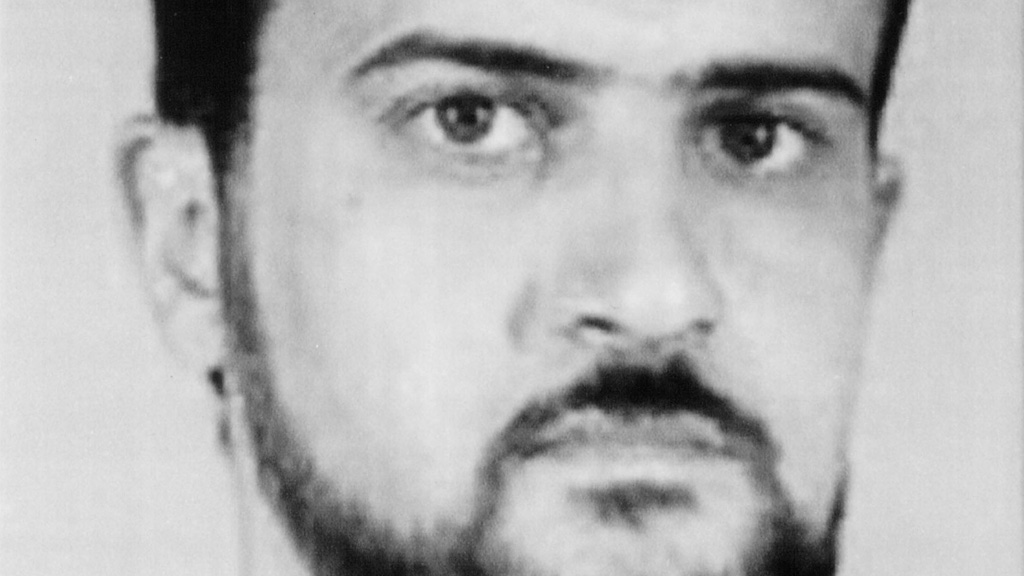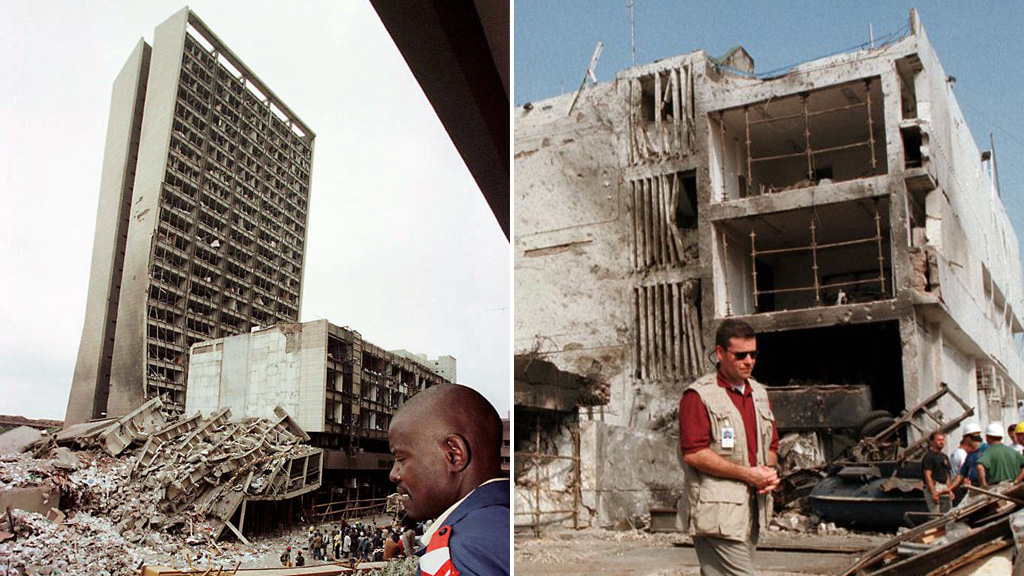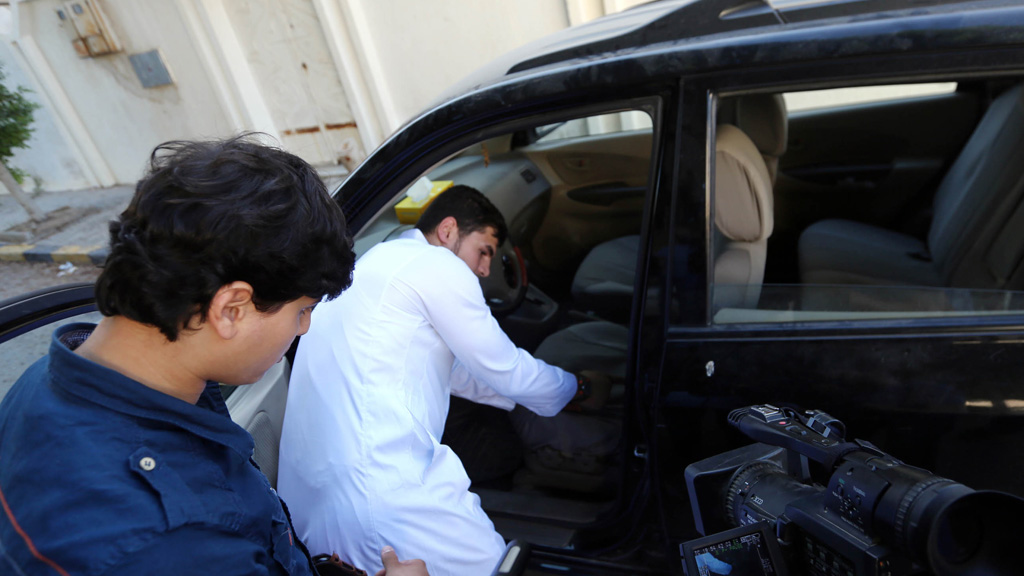‘We will never forget’: al-Libi is a US message to al-Qaeda
As US Secretary of State John Kerry defends a raid in which Anas al-Libi was captured, Channel 4 News explores who the “senior” al-Qaeda operative is, and what significance his arrest carries.

Al-Libi, indicted by the US for his alleged involvement in the 1998 al-Qaeda bombings of embassies in Nairobi and Dar es-Salaam that killed 220 people, was caught by the US Army’s Delta Force on Saturday as he returned from dawn prayers to his home in Tripoli, Libya.
The United States of America will never stop in its effort to hold those accountable who conduct acts of terror. John Kerry
On Monday, the Libyan government asked for “clarifications” about the raid, adding that it hoped the incident would not damage US-Libyan relations.
‘Never stop’
John Kerry, during a visit to Indonesia on Sunday, defended the action, saying it sent out a message that the US will “never stop” in its fight against terrorism.
He is senior in the sense that he had been there for a long time. There’s not many from that generation left. Raffaello Pantucci, RUSI
He said: “We hope that this makes clear that the United States of America will never stop in its effort to hold those accountable who conduct acts of terror, and those members of al-Qaeda and other terrorist organisations literally can run, but they can’t hide.
“We will continue to try to bring people to justice in an appropriate way, with hopes that, ultimately, these kinds of activities against everybody in the world will stop.”
The action
Al-Libi has been named in the media as a “top” al-Qaeda member, but it is the “action, not the individual” that is significant in this raid, Raffaello Pantucci, a senior research fellow specialising in counter-terrorism and the Royal United Services Institute (RUSI), says.
“They want to send out the message: ‘We don’t forget. We will find you eventually’,” he told Channel 4 News.
However, Mr Pantucci casts some doubt on just how senior al-Libi was within the al-Qaeda organisation.
“He is senior in the sense that he had been there for a long time. There’s not many from that generation left. They have either been droned or they are in Guantanamo,” he said.

Al-Libi has been reported to have been in Sudan at the same time as Osama bin Laden in the 90s, and in Afghanistan after the 9/11 attacks. In 2000 he was indicted by a US court for his alleged involvement in the embassy bombings, which took place on 7 August 1998 (pictured, above).
However, Mr Pantucci says, his role in the bombings is a little unclear.
He said: “He took some pictures in Nairobi in 1993 and then five years later the embassy was bombed. Does this make him the mastermind? I don’t think so.”
British resident
Al-Libi’s indictment, and a request from the FBI, spurred British police into action in 2000. They moved in on his home in Manchester, where he had been living for five years, claiming political asylum.
At the time, the US was offering a $5m reward for information leading to the capture of the fugitive.
Read more: Who are the FBI’s most wanted terrorists?
British authorities were reported to have found a copy of al-Qaeda’s 180-page terrorist training manual on his computer. They did not find al-Libi, however, who had fled.
However, his presence in the UK nearly 20 years ago led current Home Secretary Theresa May to make a statement on Monday, emphasising that the British approach to “extremism” is now “rigorous.”
She said: “When we came into government we took a look at how we dealt with issues around extremism, we extended the work we do to deal with extremism, we have tightened up in terms of the settlement here in the UK and for example, slightly different, I’ve excluded more extremist hate preachers than ever before.
The US is showing that it has a willingness to employ these kinds of methods. Raffaello Pantucci
“So when we came to government we took a long, hard look at what we were doing and we have, going forward, ensured that we’re taking a rigorous approach.”
Al-Libi had claimed asylum in the UK, claiming that he was a “political enemy” of the Gaddafi regime.
Indeed, al-Libi is believed to have been in Libya because he had returned there in 2011 to urge his countrymen to overthrow the former Libyan dictator, who was killed in October that year.
Controversial former MI5 agent David Shayler has also claimed that al-Libi was originally allowed to stay in the UK because he was a part of an al-Qaeda affiliated group, the Libyan Islamic Fighting Group, which Shayler claimed was paid thousands of pounds by the British secret service to assassinate Gaddafi.
The George W Bush administration claimed to have captured al-Libi in early 2002, though this was later denied.
‘Disaggregation’
Al-Libi was captured when three US military vehicles surrounded his car. The window to his car was smashed and his gun seized, before he was grabbed and abducted. The US has confirmed that al-Libi is now being held outside the US.

At the same time, a US Navy Seal team went ashore in Somalia, and raided a house in the town of Barawe, targeting an al-Qaeda member suspected of being related to the attack on Kenya’s Westgate shopping centre last month.
Two US security sources, speaking on a condition of anonymity, said the operation had failed to get its target – now named as Abdulkadir Mohamed Abdulkadir.
The missions send out two messages, Mr Pantucci says. One is the “disaggregation of the al-Qaeda threat” into different parts of the world. The other is about the methods the US will use to counter these threats.
“The US is showing that it has a willingness to employ these kinds of methods,” he said. “It is not just going to drone areas such as Pakistan and Somalia – it is willing to launch people on the ground to go and get individuals they are after.”